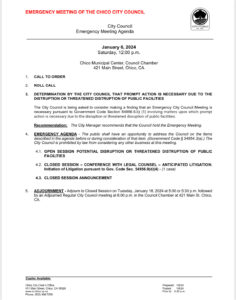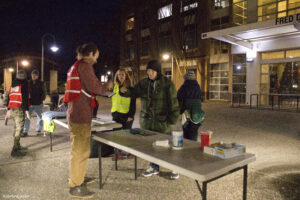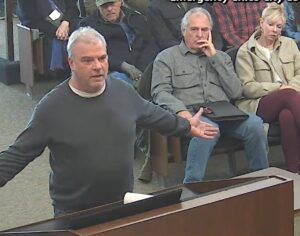by Leslie Layton
posted Jan. 11
A Jan. 6 emergency meeting held by Chico City Council appears to have been illegal – in other words, a violation of the Ralph M. Brown Act that governs meeting access in California.

The Saturday meeting was called on short notice to consider matters “involving the disruption or threatened disruption of public facilities” after the winter sheltering program, Safe Space, held intake at The Hands sculpture near the Municipal Center on Jan. 5.
An attorney consulted by ChicoSol indicated he doesn’t think the nature of the disruption justified an emergency meeting under state law. “The bottom line is, I don’t think this rises to the level of emergency under the Brown Act,” said David Loy, legal director for the San Rafael-based First Amendment Coalition (FAC) that works to defend open-government laws.
Under the statute, a body like the Council can hold an emergency meeting, short-circuiting the usual public-noticing requirement that is 72 hours for a regular meeting and 24 hours for what is called a “special meeting.” One-hour notice is “necessary if possible” for an emergency meeting, according to the FAC.
But, an “emergency” is defined by two conditions. The first is that the event, such as a work stoppage, impairs public health or safety. In addition, the event must be “dire” – such as a terrorist act – so that even the one-hour notice could be problematic.
During Safe Space intake, unhoused people congregate, check in and wait for a shuttle to a church where they can spend the night. Safe Space serves 35 to 60 people nightly and has been turning people away after reaching capacity.
After City officials booted Safe Space from the downtown building it had been using and fined the owner for an alleged code violation, intake was moved to Fourth Street by the Municipal Center for an evening. The intake operation ran from 5:30 to 8:30 p.m.

The parking lot by The Hands has posted closure hours of 10 p.m. to 7 a.m., and the sculpture space has been used by other groups, including a church that has held food giveaways there. Safe Space staffers cleaned the space they used at the end of intake and vacated the area “way before the posted closing time,” said Rick Narad, president of the nonprofit’s board of directors.
Councilmember Addison Winslow moved to adjourn early in the Jan. 6 meeting, pointing out that Safe Space had moved intake to the parking lot at Trinity United Methodist Church for at least the weekend, and suggesting that a “properly-noticed” special meeting should be held instead. “Does the emergency still stand when [Safe Space has] announced the intention to not be present?” he asked as the Council opened its meeting.
City Manager Mark Sorensen, who recommended the meeting, responded. “Unknown, because [Safe Space intake] has moved around quite a bit without any advance notice.”
There was the “apparent potential for continuing disruptions.”
The Council, led by Mayor Andrew Coolidge, who had called the meeting, then voted 4-1 in favor of the emergency meeting. Two council members, Deepika Tandon and Tom van Overbeek, were absent.
Asked by Winslow what kinds of action might be taken during the meeting, Coolidge said there were several options, adding, “I think we probably need to look at the contract for Safe Space.”
More than 100 people had filled the chambers on short notice, and 44 spoke before the Council. Most were incensed that the City seemed to be considering pulling or revising its $50,000-a-year contract with Safe Space.
Rich Ober, a former Council candidate, was among them.

“We came out in the cold in the middle of a Saturday afternoon with very little notice to do something we should not have to do – and that is defend a valued partner that has a decade of service record with the City,” Ober said at the podium. “To be here today to defend the work … is actually crazy to me.”
After almost an hour of public comment, there were 20 minutes of discussion before the Council adjourned to closed session. Vice Mayor Kasey Reynolds asked why Safe Space had so much difficulty this winter finding a location to hold intake.
“It is a major ask for any organization to give us part of their facility for three whole months,” Narad said in response, noting that in a couple of cases there have been obstacles to ADA compliance.
Before the closed session, Winslow tried again for a final adjournment. “The best thing that could happen right now is we go home, take a deep breath, maybe talk to a priest or something … I’d like to adjourn the meeting,” he said.
His motion again died for lack of a second.
Loy, the First Amendment attorney, was surprised to learn that the Council held a closed session to discuss what the agenda termed “anticipated litigation.”
“Litigation is not something you do in an emergency,” he said, adding, “It was clearly an illegal meeting.”
(Butte County District Attorney Mike Ramsey had not yet offered his view when this story was posted, but was contacted about the matter.)
ChicoSol was unable to reach Sorensen, Coolidge or City Attorney John Lam for comment, or to confirm a rumor that a city employee complained they felt unsafe passing the Safe Space intake as they left City Hall.
Even if there was such a complaint, Loy said, it wouldn’t constitute an “emergency” under the Brown Act.
“If it was really urgent you would call a special meeting,” he said. “The purpose of a special meeting is to address urgent issues that don’t rise to the level of terrorist acts or natural disasters.”
During the closed session, the Council said it banned the nonprofit from using “City facilities” for its operations and would meet with Safe Space management in an attempt to build a “trusted partnership.”
If that effort failed, the City said it would pursue litigation, presumably a restraining order.
Safe Space, meanwhile, is focused on working with the City to maintain a service that likely saves lives. It now says it has received permission to use the Trinity church parking lot for the remainder of the season, and Narad said the Jan. 9 meeting with City officials opened channels of communication.
The FAC notes that communities can respond to a governmental body violating open-meeting laws in one of several ways. In the section “Challenging past actions to stop their recurrence,” FAC’s Brown Act primer says one option — a cease-and-desist letter that would be sent, in this case, to the City — is available to any member of the public or to the district attorney’s office.
Leslie Layton is editor of ChicoSol.

Thank you for clarifying this important point of policy. Those attending had to pivot for this last-minute weekend meeting. It was angering and seemed provacative — but I was heartened to see an overflow crowd to defend Safe Space Winter Shelter program against what appeared as repeated unequal and intimidating decisions by the Council.
Thanks to Addison for airing the questions we all held, and Rich Ober for stating them in comments: how does this rise to a need for emergency meeting? The response by CC were unclear and unfounded.
Hopefully such antics as canceled meetings, unequal application of zoning fines*, and last-minute unsupported emergencies has angered enough constituents that their votes will display their displeasure at next election.
*as noted at the meeting, the full east side of same block as 7-11 building is vacant; one building’s windows have been broken for months without fine until recently.
I was present and actively participated in the “emergency meeting,” which, despite the brief notice, drew over 100 community members who demonstrated their support by standing united with Safe Space.
Councilmember Sean Morgan, however, showed a notable lack of engagement during the meeting. He appeared preoccupied with his phone, seemingly playing Candy Crush and browsing Facebook, rather than focusing on the meeting proceedings.
This level of disregard is something I have never experienced at any city council meeting in any city I’ve ever attended. It was a profound display of disrespect.
Given his apparent inattention, it would be more accurate to consider Councilmember Morgan’s attendance as absent. His presence, under such disengaged circumstances, was unhelpful and suggested that he might have been better off not attending at all.
Is the Chico City Council abusing the Brown Act with their “emergency meeting?” ChicoSol readers know the answer. What is Attorney Lam supposed to do?…bite the hand that feeds him? Will he say whatever the council tells him to say or do?…ChicoSol readers know the answer. Will DA Ramsey do his job and charge the council with violation of the Brown Act when they call meetings at questionable times in a feeble attempt to minimize public scrutiny? ChicoSol readers know the answers. Is the Chico City Council being sneaky? ChicoSol readers know the answer. ChicoSol readers, please let the council know what you think!
Plus support ChicoSol!